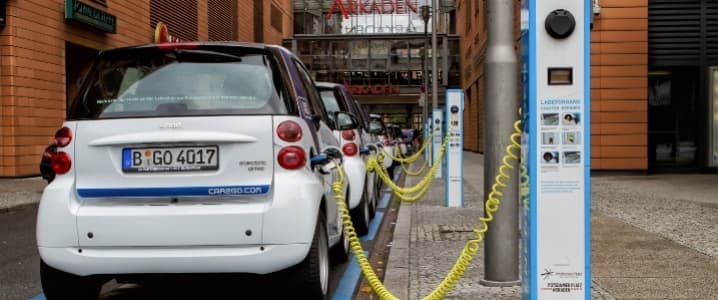Recently, William Clay “Bill” Ford Jr., executive chairman of Ford Motor Co., said China was “at the heart” of the electric vehicle and the “mobility” movements. It was an interesting statement from the head of a company once identified as the heart and soul of the U.S.'s industrial Midwest.
Ford is now developing a self driving car with a Chinese partner. And General Motors plans to sell only electric vehicles in China by 2025. China’s SAIC Motor Corporation, with sales of 6.9 million cars and net income of $5 billion, boasts that it “strives to grasp the trend of industrial development and speed up the innovation driven industrial transformation…” Sounds like a plan, a five year plan perhaps, but at least a plan nevertheless.
But if there is any doubt of direction, take a look at Tongji University’s special supplement in Science, one of the world’s most prestigious scientific journals. Tongji, a prestigious government sponsored institution in Shanghai explained its vision for the “new energy vehicle” (NEV). Given what the Tongji authors assume to be “strong support from the Chinese government and large market demand in China", they estimate five million NEVs cruising China's roads by 2020.
Tongji’s various departments are engaged in propulsion related research involving: fuel cells, hydrogen energy, batteries, motor systems, lightweight materials, hybrids, intelligent vehicles, automated and connected vehicles and car sharing. The Tongji article gave little attention to the electricity grid. All that electricity for this new industry has to be produced somewhere.
In China, the state controls the power grid. This means that major plant investment, for better or worse, is made with little or no regard for profitability. And the government's clear intent is for China to be a world leader in electric vehicles. China’s giant internet firms, which depend on government tolerance to stay in business, have already invested ride sharing and vehicle automation technologies.
U.S. and European auto manufacturers and internet giants probably have equal or greater resources than their Chinese counterparts. But we cannot assume they have the same level of government support which provides at a minimum a domestic market. Furthermore, the electricity industry in the U.S. for example consists of a multitude of public and privately-owned utilities often regulated differently from state to state and operating within three huge, transmission-interconnected areas.
The likelihood that an industry as structurally fragmented as ours can agree on uniform nationwide strategies to enable electric vehicles without government prodding or coercion is slim. Some say that we don’t need a strategy.
You can find Leonard Hyman's lastest book ‘Electricity Acts’ on Amazon
More ambitiously, others have even argued for the coming irrelevance of the electric utility industry. In this view of the future, owners of electric vehicles will no longer require a grid connection. Their electricity will be provided by a combination of solar panels, windmills and batteries. While certainly possible, this still seems a bit farfetched. The USA and China have substantial electric generating capacity and the transmis-sion system already in place to bring economic renewable energy produced on a large scale to the consumer. The grid is already there. Will they just ignore it?
This brings us to the matter of industrial policy. China's industrial policy is clearly dedicated to developing a robust domestic market for electric vehicles. If the government insists on construction of the infrastructure, Chinese NEV manufacturers will flourish in their home market. They have the opportunity to develop the scale and to be a dominant player in the worldwide electric vehicle market. Related: U.S. Shale Can’t Offset Record-Low Oil Discoveries
In the U.S., on the other hand, buyers of electric vehicles may have to purchase and install their own charging stations if commonly used stations are not nearby. Rules, rates and regulations often vary by state. That absence of uniformity at least in the near term discourages early adoption of the American EV products. Failing to obtain market share early could doom some Western manufacturers.
Over a century ago, the United Kingdom’s laissez faire politicians decided to abdicate their role with respect to industrial development. They permitted local governments and fledgling markets to decide the direction of the nation's energy infrastructure development. This lackadaisical attitude toward the nation's industrial policy greatly hampered the UK vis-à-vis other European nations. The UK’s policy is a case study in ignoring reality locally while all the competitors had come to grips with reality.
What do we need? A coherent, unified energy policy with respect to vehicle electrification and automation. And we need it soon. What we don't need is more support for aging, politically-influenced industries—even if it’s under the guise of improving reliability.
You can find Leonard Hyman's lastest book ‘Electricity Acts’ on Amazon
By Leonard Hyman and William Tilles for Oilprice.com
More Top Reads From Oilprice.com:
- 2018: The Year Of The Oil Bulls
- Will Oil And Gold Prices Rise This Year?
- Gas Wars: The First Energy Conflict In 2018



















Nonsense. China Grid and its offspring are among the most profitable, valuable corporations on earth. Major plant investment is made with regard to both profitability and public benefit, that's all.
We believe you are confusing great size with profitability. China's State grid earned a five percent return on equity on average for the last five years. That's a return level 1/2 or 1/3 below what similar for-profit companies would consider an acceptable return for this business. Their net income equals three percent of revenues also.
China's state grid makes investments that other firms consider below their cost of capital. They can do this because of government subsidies. Those subsidies are either direct or indirect via a willingness to earn subpar returns on their investment.